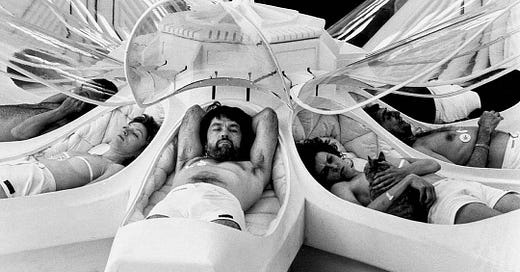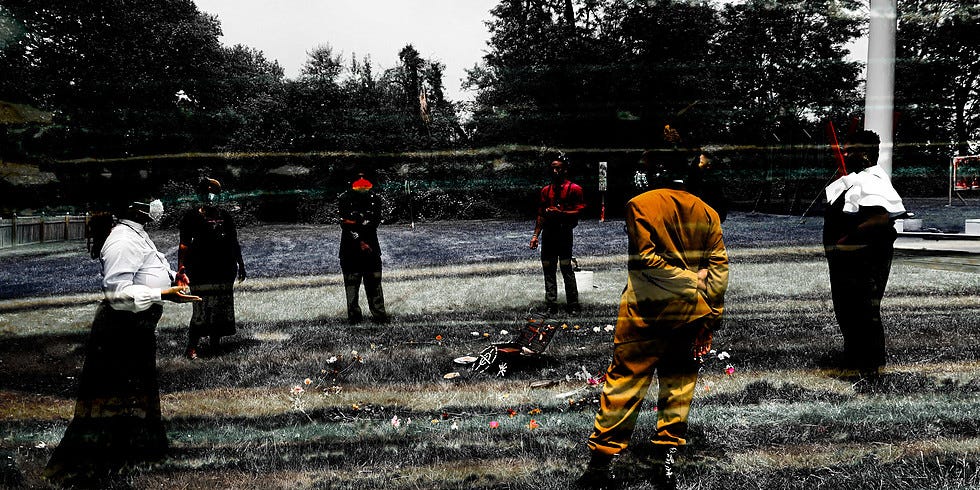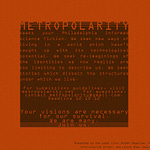DIGEST
DISABLING INFLAMMATION
COMMUNITY FUTURES ZINE BRUNCH
RECAP ON A MERCURY MONASTERY
AUDIO-ONLY (at 15min mark on the track): ☿ INTENSIVE STORY SNIPPETS
TEXT-ONLY: ☿ INTENSIVE FEEDBACK
audio note: if any audiophiles want to properly balance/screenshare/show me how to mix down my vocal trax, hmu cause i’m tired and would appreciate that ;-;
Greetings dear reader,
I sit here speaking into my computer, staring at the screen, watching my words populate into text. A scene from that mainstay of 90s Sci-Fi Channel’s Saturday night anime, Armitage the III comes into my mind, where one of the 3rd type androids, a novelist, is sitting down to dictate the current chapter of her in progress novel to her beautiful computer.
My hands are in terrible state. My chronically inflamed tendons have reached a stopping point. After so many weeks of working or writing, or intending to work or write, and not doing so because I need to rest, I realized in the past two weeks that I need to take serious measures to protect what ability I have left in my precious hands. The other day I tweeted:

And, with the sorry and miserable state of the rest of the world as my backdrop, I present my meager messenger’s bounty to you tonight (or whenever you're reading this).
COMMUNITY FUTURES ZINE BRUNCH
This Saturday, August 28th I’ll be reading and tabling wares at Black Quantum Futurism’s zine brunch & performance event, on the lawn of The Hatfield House as part of their Ancestors returning again/ exhibition
Time & Location
Aug 28, 1:00 PM – 4:00 PM EDT
Philadelphia, N 33rd St, Philadelphia, PA 19130, USAJoin us on the lawn of the Hatfield House for a light brunch, zines, performances, and an open mic to close out summer and welcome autumn! Come explore time capsules, time travel, and time shifts with performances by Black Quantum Futurism and Marcelline, and short sci-fi readings. Create, trade, read, or buy zines from local sci-fi writers and zinesters M. TÉLLEZ, Joe Hatton, and Alex Smith, youth arts collective Young Artist Program (YAP), mental health collective DeepSpaceMind 215, connect with local vendors SheenasMagickButters, get info on housing rights from TURN and Philly Rent Control Coalition and more.
Masks are required to visit the exhibition indoors and social distancing protocols will be in place.
RECAP ON A MERCURY MONASTERY
By all expressed accounts, the Mercury Intensive, my free, impromptu, experimental June-long writing and storytelling workshop, went well. If you recall, I decided I would run my own workshop after getting yet another rejection from a genre writing workshop I had been hoping to attend. (Admittedly, I don’t apply to a terrible amount of workshops or residencies, but that is in part because I often lack the capacity to spend my free time applying to these things, let alone plan for how the hell I will be able to afford them.) The intensive met four times a week from 7 to 9 PM for four weeks in a row. I put out an open call for applicants and received 28 submissions. I wound up accepting every single one and split them into what ended up being roughly 2 equal sized groups: a focused group and the general group.
The focus group was comprised of people born and raised in Philadelphia, people who already had some sort of longform writing or creative storytelling practice, and people who did not have much previous experience or access with institutional creative writing or art education. The general group was more transplants, people who did have experience with creative writing or art or whatever in college, and people who had less disciplined writing practices (many of whom expressed they were more looking for accountability or community around writing).
I decided we would use Discord as our meeting place, and set about creating a cyberspace modeled on a monastery, a place of disciplined practice and learning. Discord is handy because it allows you to create chat rooms as well as voice rooms and streaming capabilities, and to create user roles that allows you to assign permission to certain areas. Hence, apart from the common rooms, I set up the monastery so that the focus group would have a priority ability to interact and speak, while the general group could watch and input without intruding on focus group activities. But in the end many people from both groups attended when they could, meaning several had to drop out or only attended a few times, leaving a core group of 10 or so individuals. I think every session we had a minimum of three or four people, averaging five to eight on most days, not including myself.
For the first two-thirds of the intensive we mostly did a brief discussion topic for anywhere from 20 to 40 minutes, before moving into 40 minutes of writing time, followed by an hour or so of sharing what we wrote and discussion. Then we moved into doing longform critiques for the remainder of the intensive, assigning each other readings beforehand, and finally gently petered out in the very last week of June by discussing some topics that we’ve weren’t able to cover earlier.
I made sure to collect anonymous feedback after every session, and by the middle of the first week I also made sure to post our daily agenda as far in advance as I could manage because it seemed to benefit the attendees.
I was also totally grieving the death of my father, thrown for an extra loop after a surprise connection with estranged family members, so even though I dramatically reduced my pay-job workload during the intensive and had planned to have a lot of “time to myself” and even fantasized that I would make progress on the all that’s left manuscript, what really happened is that I prepped & showed up for the intensive and then spent the rest of the time in a mournful stupor.
From my perspective as the intensive’s inceptor and facilitator, I was really glad that people showed up and continued to show up, and that my efforts were not in vain. I liked what I wrote and I liked the structure that I tempered, as someone who, at the time, never participated in a “real” writing or critique workshop (or any tbh). This was definitely on some ‘if you build it, they will come shit’, and I give my thanks and gratitude to everyone who came or wanted to come, to the saints and spirits, and to the gods of communication and writing themselves.
I definitely need real material support to keep going, and I am starting to call that to me. We are all figuring out how to do that. Weave it all together. Isn’t that always what we have to do? Is this living? Ask yourself.
It is thanks to the Leeway Foundation and the Philly Office of Arts, Culture and Creative Economy (for their Illuminate the Arts Grant) that I was able to pay my rent & cover my necessities, so I could work fewer hours and be able to do this workshop. Philly doers and dreamers, I recommend subscribing to the newsletters of both these groups, as they frequently advertise grant & open call information. If you do creative shit that connects with people, and you document it in some public digital way, you should check out grant applications that you hear about, just to see if what you do fits.
Now. If you’re listening to this dispatch [via my newsletter], you’ll hear me read some of what I came up with during several of the workshop’s 40 minute writing prompts. Please write me if you’d like the text for any of these pieces. I may host them on Cyborg Memoirs, although for fun things like this, I’m considering starting up a printed mail-order version of this newsletter as something for paying subscribers (and everyone can get the PDF without paying).
If you’re reading the text version, then you’ll see three random participant’s feedback from the final 10-question workshop survey questions.
☿ INTENSIVE Feedback
1) What were your expectations heading in to the intensive? Hopes? Fears? Aspirations?
I was super afraid that everyone would be cooler and a better writer than me. Turns out I was correct but the vibe was nice and everyone was extremely encouraging so it didn’t matter. I was hoping to really launch my fiction writing and I really did despite getting sick in the middle of the workshop and also moving across country.
I expected a pretty strict structure, and to mostly hang back during sessions. I hoped to find people to share work with, who would inspire me and whose feedback I trusted. I definitely found this. I really hoped to finish one longer piece, and while I didn’t quite make that goal, I did make some good headway.
excited to write a lot more/build up more work, meet other writers and share mutual support of our endeavours, inferiority worries
2) What went well?
i got a lot of new writing done with both old and new projects, gained anew little writing community. it was reflexive to the needs of the group. writing exercises were really great and i really enjoyed the critique sessions. oneof the most valuable things to me was the dedicated writing time
Reading other people’s work and hearing what worked and didn’t work was really helpful. I also found the supplementary reading material that people suggested really great. Reading Jamie Berrout’s work changed my life.
i made it to almost every one! it was awesmoe that there was a core group showing up it was a real thing, not like ‘whose gonna show up this week will anyone show up this week’ really speaks to the power of the structure and leadership and how people wanted to be there
3) What could’ve gone better?
I feel like a month was a little short and I think as soon as everyone was hitting their strides and getting more comfortable with the aspect of critiquing and socially workshopping each other’s work it ended.
I think that there were a few hiccups with workshop formatting. It’s tough with an intensive, because there really isn’t all that much time to read people’s work before class, but once we got over that hurdle (who’s going, are we giving written feedback, are we reading in session etc etc), I think we got into a good rhythm.
hm. well i think we were figuring some things out on the fly, like overall structure for the intensive, which is understandable. i think moving towards doing longer drafts at the end was the right move, but kinda sudden so i remember not feeling like i had a piece ready for that, and i think it would’ve been cool to spread that out over more sessions.
4) Was there anything else that you found difficult and confusing? Enjoyed and found helpful?
making time multiple times a week was difficult, but i appreciate it because it forced me to make time for craft. i think one thing that was confusing at times during discussions was answering multiple prompts at once versus going through each prompt or discussion question one by one and giving time to each. i think sometimes it made it hard for me to know which question to address first
encouragement and strategizing on everything from ergonomics to story structure was really helpful.
I had never used discord before, and I was surprised by how enjoyable it was. I did struggle a bit to keep up with the chat and video. However, by the end of the month I found i was more fluent, which was fun, and it felt like play. I do find structuring a narrative difficult, and was often intimidated by all the novelists / longer form folks in the room, so having space to share resources and thoughts on this was super helpful.
5) What was something unexpected that happened for you?
I actually am writing a story that I really, really like.
I read my work out loud without wanting to shrivel up and disappear
Surprised that people critiqued my work as ‘wanting to know about the intention of the author’. I’ve never had my personal designs raised against my stories before. I think this was a good thing.
making friends! liking the things i wrote. thinking about the group all the time & scheming on stories
6) What is something that you would have liked to focus on, that we didn’t or rushed over?
world building, especially designing systems of magic or mythology & the way that reflects/affects power structures and society in the story & how it reflects the underlying values of the storyteller
I think I would have been interested in learning more about navigating career stuff for writers outside the traditional publishing structure? That’s not exactly writing workshop stuff and more just writer’s stuff in general.
i’m generally into the idea of helping people grow into the kind of writers they are at that very moment, and encouraging people to get more comfortable in cultivating whatever their own practice of writing is.
more of that and i think less discussions around what we think writing should be, or what we think we’re doing with our writing. i think those discussions were really good in this session, valuable, and eye opening. but. maybe a bit more of that than i needed.
7) How did you wind up participating vs how you thought you would? [[e.g. attend every session, write every day, only got to a few sessions, only came one time, showed up but didn’t speak (and wanted to/and was fine), wrote on your own time, etc]]
i was in the general group so i thought i was going to be mostly observing; i didn’t anticipate sharing my writing, or speaking up in group, or anything like that. i was happy and surprised that i was able to make it to as many sessions as i managed.
Ugh, I definitely participated less than I hoped I would originally. I think I came about 2x a week, which was actually a lot to commit to with all the other stuff I had going on that month. But I got a lot out of the twice a week. It took me a while to warm up to be an active participant and even turn on my camera. I really appreciated Monk’s active encouragement to speak up sometimes! <3
I wound up coming to most sessions, and shared more than I was expecting (recently I sort of freeze when asked to share work). I thought I would mostly hang back and listen, but I ended up participating more. I still felt nervous, and wish I had given more feedback.
8) So that said, how did the intensive structure work for you? How could it have been more supportive of your goals?
The intensive structure worked well for me! I think it could have been helpful to have more free writing sprinkled in at the end of the intensive during the workshop weeks, just because this concentrated time was so generative for me and helped shake up thought patterns. In the future I’d be eager to hear about people’s longer-term process (as in: how do I not just drop this draft once workshop is over and the rejection emails start rolling in again. how do I return to an old story). In this vein, I’d also like to hear more about sharing work. Publishing is………disheartening. Self publishing and collaborating to get work out there is exciting, but sometimes I feel like I’m spinning wheels in place when I think about actually following through, so I would have loved to linger on this section of the intensive longer (maybe just a channel for this discussion?).
I think the 4 meetings a week was a lot without it being a residency thing, and made me feel some FOMO that I couldn’t be as involved as others/as I wanted to. I guess I could have if I had put some more of my other life on pause but I was originally in the General group which made me feel like I was going to have more of a peripheral presence. It also created a bit of the feeling that some people were more inner circle because they could attend more, even though the focused group and general group distinctions were removed after two weeks or so. AND I think it makes sense that people who attend every session ARE the inner circle, because they’re demonstrating that they’re truly committed, but it did make me question myself and my role a lot. It took me a while to figure out the participation norms and to realize that actually the space was really warm and welcoming and understanding and supportive. All that’s still kinda about my expectations and my own head shit and learning what the intensive actually was. I really appreciated the feedback form at the end of each session and knew that you took care to read them and change gears, and I felt really glad that we pivoted to doing crits in week 3 cause I think it really helped us get to know each other as writers and readers better. THANK YOU!
I didn’t know what to expect and was a little nervous that I wouldn’t be able to keep up with it but for the most part it was low-stakes but in a positive way, I liked the casual atmosphere and being able to drop-in and see work and word count increase over the duration of the intensive, again I just feel like it ended abruptly just as things were starting to pick up.
9) What can I improve or change about my facilitation for next time?
i wasn’t always clear on what the expectations were for each session in terms of assignments (moreso in the early weeks and then i think it got more explicit, or maybe i just got better at using discord). also sessions sometimes went a lot longer than planned, which was always optional and fun but then i felt like i was overextending my physical needs to be there (or going to bed n having fomo)
have only one discussion question, or leave time to dedicate to each question separately,, give time for people to think about their answer
Honestly I think that your facilitation was wonderful. And so helpful. For next time, it would probably be helpful to have more structured facilitation during workshop, but even then I think that you got into a very smooth groove by the end.
10) TESTIMONIAL?? This intensive was $$ free because it was an experiment and a group effort. A bunch of people in my circle thought I already was or said I should charge for something like this, but I’m not ready for that kinda life yet, and anyway some things should just be done because they need to be done. However! I would like a testimonial, if you liked this workshop so much that you’d recommend it to a friend, or would take it another time, or wanna gas me up in general.
The Mercury Intensive was a really supportive neighborly kind of writing community that cut the shit in a lot of ways and helped me break through a lot of bitterness and cynicism i have had towards my writing for a while. Prompts, readings, and discussions all pushed us continuously to decenter tired colonizing literary tropes and structures, and to take the responsibility storytelling and worldbuilding seriously . Feedback sessions were very useful, especially after building rapport through co-writing and facilitated discussion, it was a really good environment to be challenged, supported, and pushed to be better. Definitely a month well spent.
This workshop was one of the best things that I’ve done for both my writing and myself. The facilitator worked hard to create an atmosphere of mutual respect and intellectual growth. I learned more in a couple weeks about writing than I have in years. My writing practice and sense of myself as a writer have grown immeasurably as a consequence.
The intensive was well structured and consistent, while remaining flexible and responsive to participants desires. Monk was a wonderful leader and facilitator, making the decisions that had to be made and keeping everyone on track, but the intensive also had a distinct collaborative feeling to it, like we were all creating it amongst ourselves as we went. […] As for the transformation this workshop facilitated for me–this intensive gave me the time and support I needed to explore an inner landscape i had the scent of, but too much timidity to follow. The exercises allowed me to experience glimpses of it in a way that felt pleasurable, joyful, and not pressured. And as I built on glimpses I felt I might have something here. The intensive gave me structure I needed to gain more comfort and familiarity with my own adult writing practice. It also gave me access to adult writers with much more experience than me, who were generous in their guidance to younger types. I cannot overstate how valuable and insightful Monk’s writing prompts and suggested writing exercises were. They have an ability to get to the heart of things.. As a mentor to my writing, they are able to find the tightest knots, and writing to release these has been more therapeutic for me at times than talk therapy. Thier prompting push me to write what matters.
Taking Monk’s workshop reinvigorated my writing practice in a way I never expected. From generative prompts to critical feedback, Monk’s facilitation inspires confidence and trust–each session was surprising and built a strong foundation for challenging work. Monk made a space that was playful and intentional, where we could take ourselves, our work, seriously, and still fool around with characters/conceits/ideas that caught our eye. Each session began with an intention, a clear focus, and I never left feeling like we hadn’t addressed the task at hand. Having a space to return to most days cleared so much of the angst I feel writing alone. Writing daily or nearly daily feels urgent, and I trust the urge. Also urgent: to find writing community/comrades/crews to share work with, chat with, inspire with, share digital or physical space with. Monk made this space possible, spun a whole monastery out of thin air.
Stay tuned, love. It’s always nice to hear from you.
Till next time.
@}-}-;——-
Monk

















Share this post